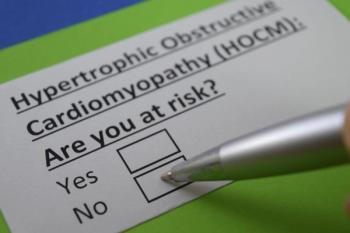
- Drug Topics March 2021
- Volume 165
- Issue 3
Vericiguat (Verquvo) for Heart Failure With Reduced Ejection Fraction
A new drug review for vericiguat, indicated for heart failure, reports efficacy and safety data.
Heart failure with reduced ejection fraction (HFrEF) is characterized by dyspnea or exertional limitation and occurs when the left ventricular ejection fraction (LVEF) is 40% or less.1 Treatment for patients with HFrEF includes a diuretic, a beta blocker, and either an angiotensin receptor-neprilysin inhibitor, an angiotensin-converting enzyme inhibitor, or an angiotensin receptor blocker. Ivabridine, hydralazine/ isosorbide, and sodium-glucose cotransporter 2 inhibitors have also been shown to provide additional benefit in patients with persistent symptoms. On January 20, 2021, the FDA approved vericiguat (Verquvo; Merck) for use in adults with symptomatic HF and an ejection fraction less than 45% to reduce the risk of cardiovascular death and HF hospitalization following a hospitalization for HF or need for outpatient intravenous diuretics.2 HF is characterized by myocardial and vascular dysfunction, which may be due to impaired synthesis of nitric oxide (NO) and decreased activity of soluble guanylate cyclase (sGC).2,3 Vericiguat stimulates sGC, an enzyme that, when it binds to NO, catalyzes the synthesis of intracellular cyclic guanosine monophosphate (cGMP). The increased intracellular levels of cGMP lead to smooth muscle relaxation and vasodilation.
Efficacy
The efficacy and safety of vericiguat are based on the results of the VICTORIA trial.4 This was a phase 3, randomized, double-blind, placebo-controlled trial that randomized 5050 patients with chronic HF (New York Heart Association (NYHA class II-IV)) and an ejection fraction less than 45% to receive either vericiguat 10 mg daily (n = 2526) or placebo (n = 2524), in addition to guideline-based medical therapy. The primary outcome was a composite of death from cardiovascular causes or first hospitalization for HF and occurred in 35.5% of patients in the vericiguat group and 38.5% of patients in the placebo group. The secondary end points were cardiovascular death and HF hospitalization. Cardiovascular death occurred in 12.9% and 13.9% of patients given vericiguat and placebo, respectively. HF hospitalization was reported at 25.9% and 29.1% of patients in the vericiguat and placebo group, respectively. The study investigators concluded based on the efficacy data from this study, that vericiguat reduced the incidence of death from cardiovascular causes or hospitalizations for HF compared with placebo.
Safety
The prescribing information for vericiguat contains a warning for embryo-fetal toxicity and is contraindicated in pregnant females.3 Females of reproductive potential must use effective forms of contraception during treatment and for 1 month after stopping the treatment to prevent pregnancy. Vericiguat is also contraindicated in patients taking other sGC stimulators and is not recommended to be used in patients also taking phosphodiesterase-5 inhibitors due to the potential for hypotension. The most common adverse events seen in the VICTORIA trial were hypotension (16% vs 15% in the vericiguat and placebo group, respectively) and anemia (10% vs 7% in the vericiguat and placebo group, respectively).4
Dosing and Administration
Vericiguat is available as 2.5, 5, and 10 mg tablets.3 The initial dose is 2.5 mg orally once daily with food. The dose may be doubled about every 2 weeks until the target maintenance dose of 10 mg once daily is achieved, as tolerated by the patient. The tablets may be crushed and mixed with water immediately before administration in patients who are unable to swallow whole tablets. Vericiguat does not need to be dose-adjusted in patients with an estimated glomerular filtration rate (eGFR) < 15 mL/min/1.73 min2 or with mild or moderate hepatic impairment. Vericiguat has not been studied in patients with an eGFR < 15 mL/min/1.73m2, patients on dialysis, or patients with severe hepatic impairment (eg, Child-Pugh C). If a dose is missed, the patient should take the dose as soon as the patient remembers on the same day of the missed dose. Patients should not take 2 doses on the same day.
Katelyn Yamartino, PharmD, is a PGY-1 pharmacy resident at UConn John Dempsey Hospital at UConn Health, Farmington, Connecticut.
Kevin W. Chamberlin, PharmD, FASCP, is university director of pharmacy residency programs at UConn Health.
References
- Murphy SP, Ibrahim NE, Januzzi JL Jr. Heart failure with reduced ejection fraction: a review. JAMA. 2020;324(5):488-504. Published correction appears in JAMA. 2020;324(20):2107. doi:10.1001/jama.2020.10262
- Merck Announces U.S. FDA Approval of VERQUVO® (vericiguat). News release. Merck. January 20, 2021. Accessed February 3, 2021. https://www.merck.com/news/merck-announces-u-s-fda-approval-of-verquvo-vericiguat/
- Verquovo. Prescribing Information. Merck; 2021. Accessed February 3, 2021. https://www.merck.com/product/usa/pi_circulars/v/verquvo/verquvo_pi.pdf
- Armstrong PW, Pieske B, Anstrom KJ, et al. Vericiguat in patients with heart failure and reduced ejection fraction. N Engl J Med. 2020;382(20):1883-1893. doi:10.1056/NEJMoa1915928
Articles in this issue
almost 5 years ago
Discussing Pain Management Options With Patientsalmost 5 years ago
Leveraging New Technologies to Prevent Drug Shortagesalmost 5 years ago
Tips for Optimizing Pharmacy Taxesalmost 5 years ago
Multiple Sclerosis: Treatment Options and Counseling Tipsalmost 5 years ago
Women Pharmacists Are Leading Successful COVID-19 Vaccination Programsalmost 5 years ago
Improve Immunization Efficiencies With Automationalmost 5 years ago
Women in Pharmacy Making Strides to Close the Leadership GapNewsletter
Pharmacy practice is always changing. Stay ahead of the curve with the Drug Topics newsletter and get the latest drug information, industry trends, and patient care tips.























